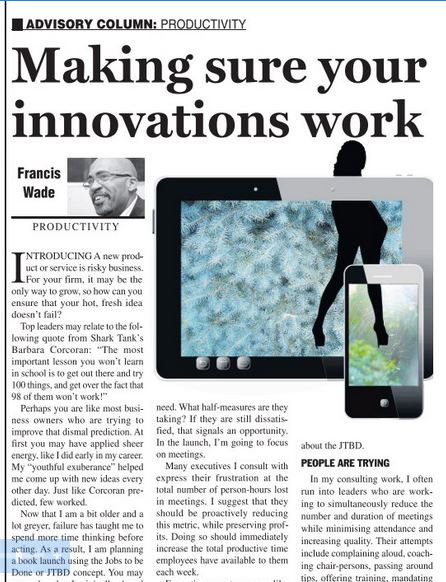Introducing a new product or service is risky business. For your firm, it may be the only way to grow, so how can you ensure that your hot, fresh idea doesn’t fail?
Top leaders may relate to the following quote from Shark Tank’s Barbara Corcoran: “The most important lesson you WON’T learn in school is to get out there and try 100 things and get over the fact that 98 of them won’t work!”
Perhaps you are like most business-owners who are trying to improve that dismal prediction. At first you may have applied sheer energy, like I did early in my career. My “youthful exuberance” helped me come up with new ideas every other day. Just like Corcoran predicted, few worked.
Now that I am a bit older and a lot greyer, failure has taught me to spend more time thinking before acting. As a result, I am planning a book launch using the Jobs to Be Done (JTBD) concept. (You may remember that I originally shared the idea in a Gleaner column of 20-11-2016.)
To recap, JTBD dictates that before you create a new product, delve into the world of the customer to understand how they are attempting to meet a specific unmet need. What half-measures are they taking? If they are still dissatisfied, that signals an opportunity. In the launch, I’m going to focus on meetings.
Many executives I consult with express their frustration at the total number of person-hours lost in meetings. I suggest that they should be proactively reducing this metric, while preserving profits. Doing so should immediately increase the total productive time employees have available to them each week.
Executives want answers like these delivered in digestible ways, so my idea is to create an interactive, mobile game that can be completed during the book launch within just a few minutes. During the design process, I have learned the following three insights about the JTBD they have of improving meetings that apply to all innovations.
1. People are trying
In my consulting work, I often run into leaders who are working to simultaneously reduce the number and duration of meetings, while minimizing attendance and increasing quality. Their attempts include: complaining aloud, coaching chair-persons, passing around tips, offering training, mandating books to read, putting up posters and giving out checklists. But these measures have little impact. (In many cases, CEO-led meetings are some of the worst.)
From the JTBD perspective, an innovative approach would replace some of these activities. When they play the interactive game, I want them to discover these solutions, thereby moving them past their sense of defeat.
If you happen to be an innovator, the frustration experienced by people trying to complete a JTBD can be a good sign. If your solution works, the unique value it creates will have an emotional component. Conversely, a lack of frustration may indicate that you are barking up the wrong tree.
2. Your prospects need a new mental model
As attendees play the interactive game on their phones, I want them to experience what it’s like to solve the meeting problem using a fresh paradigm.
In most firms, meetings have become the worst time-wasters. Thanks to email, any staff member can call a meeting, and invite anyone. Due to a lack of feedback, if they execute the event poorly they may never realize that an improvement is needed.
In the new line of thinking I’ll introduce, meeting time should be managed like money. As a shared but scarce resource, it must be budgeted, monitored and spent with care. Giving an employee the total freedom to call meetings is like allowing them access to blank checks. This mental model destroys that practice.
3. They may respond to a new experience
It’s no longer enough to blast customers with: “My New Innovation is Better Than Anything You Are Doing!” Instead, it’s better to offer an experience that allows them to draw their own conclusions.
Think of new car salespersons. They don’t merely show pictures and point out features on a screen. The test-drive simulates the experience of ownership by immersing the buyer in a brand new, multi-sensory environment.
In the interactive game, I hope to do the same. As participants play, they assume the role of a fictional CEO who must solve his company’s meeting problems. Just like in real life, they have limited information, and uncover hidden surprises, plus the consequences for their choices.The big lesson is that new innovations start with the JTBD your prospective customer is doing, not with anyone’s bright ideas. If you begin in the right place and apply enough rigour, you can dramatically increase the odds of success for your new idea.
http://jamaica-gleaner.com/article/business/20190811/francis-wade-making-sure-your-innovations-work

